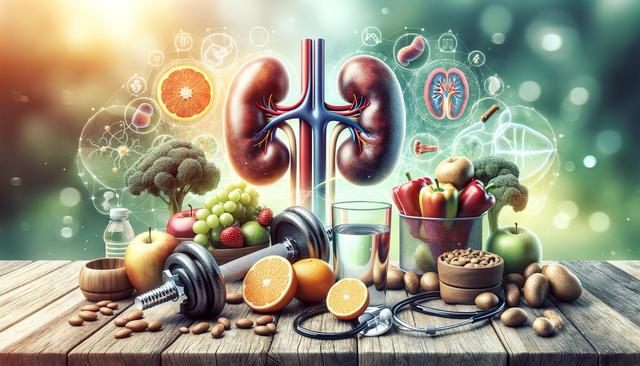Effective Ways to Lower Creatinine Levels Naturally
To lower creatinine levels, focus on kidney health with proper hydration, a balanced diet, and avoiding excessive protein intake. Regular exercise and managing underlying conditions like high blood pressure or diabetes can also help reduce creatinine levels.

Understanding Creatinine and Kidney Function
Creatinine is a waste product generated by muscle metabolism and is filtered out of the blood by the kidneys. Maintaining healthy creatinine levels is vital, as elevated levels may indicate impaired kidney function. When kidneys don’t work efficiently, creatinine accumulates in the bloodstream, potentially leading to complications. Routine blood tests measure creatinine levels to assess kidney health and detect early signs of kidney disease. Knowing your baseline levels and monitoring changes over time can help manage kidney-related issues proactively.
Factors such as intense exercise, high-protein diets, and certain medications can temporarily raise creatinine levels. However, persistent elevation often points toward chronic kidney problems. Understanding what affects creatinine production and elimination is the first step in taking measures to lower it. Addressing the root causes and making healthy lifestyle changes can support kidney function and help maintain optimal creatinine levels.
Dietary Changes to Support Kidney Health
One of the most effective strategies for lowering creatinine levels is modifying your diet. The kidneys play a crucial role in filtering waste from the foods we consume, so choosing kidney-friendly foods is essential. Reducing protein intake, especially from red meat and dairy, can decrease the production of creatinine. While protein is necessary for health, too much can overburden the kidneys.
Consider these dietary adjustments:
- Limit high-protein foods such as beef, pork, and poultry
- Choose plant-based proteins like lentils, chickpeas, and tofu
- Reduce sodium intake to prevent fluid retention and high blood pressure
- Increase fiber-rich foods such as fruits, vegetables, and whole grains
- Avoid processed foods and sugary drinks
It is also helpful to work with a registered dietitian to develop a meal plan tailored to your specific health needs. A well-balanced diet supports overall kidney function and can contribute to gradually lowering elevated creatinine levels.
Importance of Staying Hydrated
Hydration plays a significant role in maintaining kidney health and regulating creatinine levels. Dehydration can lead to reduced kidney function, causing creatinine to build up in the bloodstream. Drinking enough water helps the kidneys flush out toxins and waste products efficiently. However, excessive fluid intake without medical supervision can also be harmful, especially for those with advanced kidney disease.
To stay adequately hydrated:
- Drink clean, filtered water regularly throughout the day
- Avoid excessive consumption of caffeinated or sugary beverages
- Monitor urine color (light yellow indicates proper hydration)
- Consult a healthcare provider about your specific fluid needs
Individuals with kidney concerns should avoid overhydration and follow medical advice tailored to their condition. In some cases, fluid intake may need to be restricted to prevent fluid overload. The goal is to strike a balance that supports kidney function without causing additional strain.
Managing Chronic Conditions
Underlying health conditions such as high blood pressure and diabetes can significantly impact kidney function and creatinine levels. Poorly managed diabetes can damage the blood vessels in the kidneys, while high blood pressure can cause long-term wear on kidney tissues. Managing these conditions effectively can help protect kidney health and reduce creatinine buildup.
Recommended steps include:
- Regular monitoring of blood sugar and blood pressure levels
- Taking prescribed medications consistently and as directed
- Maintaining a healthy weight through nutrition and exercise
- Scheduling regular check-ups with a healthcare professional
Lifestyle changes like quitting smoking, limiting alcohol intake, and reducing stress can also have a positive impact. Managing chronic conditions not only supports kidney health but also enhances overall well-being, reducing the risk of further complications.
Incorporating Physical Activity and Rest
Exercise is beneficial for overall health, including kidney function. Moderate physical activity can help control blood pressure, improve circulation, and support metabolic health—factors that influence creatinine levels. However, excessive or intense workouts may temporarily increase creatinine due to muscle breakdown. The key is to find a balance that promotes health without causing strain.
Tips for incorporating exercise:
- Choose low-impact activities such as walking, swimming, or cycling
- Exercise for at least 30 minutes most days of the week
- Listen to your body and avoid overexertion
- Include rest days to allow muscle recovery
In addition to physical activity, getting adequate rest and sleep is crucial. The body repairs itself during sleep, and proper rest supports hormonal balance and kidney function. Prioritizing both movement and rest helps maintain a healthy lifestyle that can support efforts to manage creatinine levels.
Conclusion
Lowering creatinine levels is a multifaceted approach that involves dietary adjustments, hydration, managing chronic health conditions, and incorporating balanced exercise and rest. For individuals concerned about kidney health, these strategies offer a practical and natural way to support their well-being. By taking proactive steps and working with healthcare professionals, it’s possible to make meaningful progress toward maintaining healthy creatinine levels and protecting long-term kidney function.